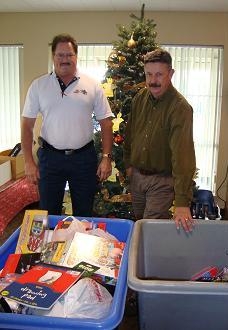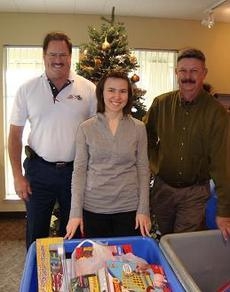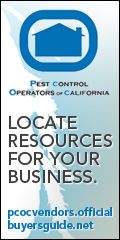
| January 2011 | Past Issues | Printer-Friendly | Advertise | Affiliates Search | Find a Pest Control Operator | PCOC.org |
|
EVP NOTES
I don't know about you, but I have never been very good about making new year's resolutions. Most of the popular ones, like losing weight, giving up coffee or quitting smoking – I've never really felt very strongly about. One thing though that a new year does suggest is that we focus on the many things that remain the same... but also the many things that will change during the upcoming 12 months. As I reflect on the work ahead for your trade association, the work of protecting the pest control industry in California and being THE voice for the industry, YOUR voice, I thought about a couple of PCOC resolutions that are appropriate at this time: MAINTAINING A STRONG ASSOCIATION – This includes growing the membership: doing everything possible to bring in new members and make sure we go the extra mile to make sure current members do not drop out. We also need to expand our non-dues income. It is essential that we maintain a strong revenue stream for the association so that we are not forced to go backwards. HIRE A PROFESSIONAL MESSAGE – At no time in our industry's history has it been more critical to get the word out to the public and elected officials alike that hiring a professional for pest control is the responsible thing to do. From the environmental standpoint alone, it is critical that people know that with a highly regulated professional industry, usage of pesticides for the structural pest control industry has dropped by 51 percent over the past three years. PCOC's GreenPro program is the industry standard. ADOPT A LEGISLATOR PROGRAM – Elected officials and bureaucrats, who have never written on the front of a paycheck, need to understand what it is like to operate a pest control company. 2011 will give us a great opportunity: there are 40 new legislators in Sacramento! Each one needs to understand the day-to-day frustrations that PCOC members feel. We will do this through breakfast and lunch meetings both in Sacramento and in the districts and also, by inviting elected officials to spend a day with a pest control professional. We have some great and important work ahead. HAPPY NEW YEAR! LEGISLATIVE UPDATE
UPCOMING EVENTS
You can book your rooms and purchase tickets for the theme parks now. Just click on the appropriate link below: Room Reservations: https://resweb.passkey.com/go/pestcontrol2011 Theme Park Tickets: http://www.disneyconventionear.com/GDPF11A Please note: These special theme park ticket prices are not available once you arrive at the resort. Our ticket store closes at 9 p.m. PST on 6/19/2011 so don't delay.
2011
March 25-26
Board of Directors Meeting
Marriott Laguna Cliffs Resort
Dana Point, CA
April 26-27
Legislative Days
Hyatt Regency
Sacramento, CA
June 3-4
Leadership Academy 2011
Silverado Resort
Napa, CA
June 23-25
PCOC's 68th Annual Convention & Tradeshow
Disneyland Hotel
Anaheim, CA
September 23-24
Board of Directors Meeting
Embassy Suites
Lake Tahoe, CA
December 9-10
Board of Directors Meeting
Hilton Palm Springs
Palm Springs, CA
BILLY'S BULLETIN BY BILLY GAITHER
MEMBERSHIP CONTEST The 2011 membership contest is now active. Here is an opportunity to increase membership in your association and to make yourself eligible to win up to $2,000.00. Please use the attached link to view the contest rules and read them very carefully: click here. PREVENTING SEXUAL HARASSMENT IN THE WORKPLACE Sexual harassment is illegal and is considered a form of sexual discrimination. For business owners, sexual harassment also creates an unproductive, unpleasant working environment that robs your business of money, mental energy and lost productivity. Business owners MUST protect themselves, their businesses, and employees by implementing and enforcing a ZERO TOLERANCE for sexual harassment. In this article you will learn some background on the issue and tips on what you can do to protect yourself and your business from sexual harassment in the workplace. What is Sexual Harassment? Sexual harassment is the unwelcome sexual attention or conduct of supervisors, co-workers, customers, venders or anyone with whom the employee interacts with on the job. Sexual harassment can come from men or women against those of the opposite sex or same sex and from peers as well as supervisors. There are two categories of sexual harassment: Quid Pro Quo and Hostile work environment. Quid Pro Quo means "this for that" or "something for something." The employee's submission to the unwelcome behavior is made explicitly or implicitly a term or condition of employment. The employee's submission or rejection of the unwelcome conduct is used as the basis for employment decisions affecting the employee. For example, quid pro quo sexual harassment exists when a supervisor threatens to fire an employee because he or she will not comply with sexual demands, or when an employee does not receive a promotion because he or she rejected unwelcome conduct. In Quid Pro Quo harassment, the harasser is always liable AND the employer/company is always liable (even if you don't know it is happening). Hostile Work Environment exists when the unwelcome conduct has the purpose or effect of unreasonably interfering with work performance and the conduct creates an intimidating hostile or offensive work environment. The conduct must be "severe or pervasive" enough that a reasonable person would find it hostile or intimidating. It is best understood by providing examples: Discussing sexual activities, telling sexual jokes, commenting on physical attributes, using demeaning or inappropriate terms, using crude or offensive language or posting "pin-up" girl (or guy) calendars or cartoons. There are varying degrees of liability for a business owner, even if you did not know it was happening! But you can protect yourself with a clear sexual harassment policy and enforcing its provisions. Get a Written Plan! Every employer must have a sexual harassment policy and procedure for its employees. Many small businesses neglect to adopt written sexual harassment policies because they believe they are not large enough to require such a document. However, no business is immune from sexual harassment claims or from ensuing litigation. That reason alone should convince a company to create a written policy. Verbally informing employees about the company's position on sexual harassment is a good start. A written sexual harassment policy is the most effective first step you can do to protect yourself and your employees from sexual harassment in the workplace. How Can I Create an Effective Sexual Harassment Policy? Sexual harassment policies may differ from company to company and a company should consult with professionals in customizing one for their company, but, all effective policies should include the following:
How Can an Employer Prevent or Correct Unwanted Sexual Harassment? An employer should correct harassment that is clearly unwelcome regardless of whether a complaint is filed. For example, if there is communication or graffiti in the workplace containing racial or sexual epithets, an employer should not wait for a complaint before removing it. An employer should ensure that its supervisors and managers understand their responsibilities under the company's harassment policy and complaint procedures. Finally, an employer should keep records of harassment complaints and check those records when a complaint of harassment is made to reveal any patterns of harassment by the same individuals. PEST ED 2011
Pest Ed 2011 was a HUGE SUCCESS. We had 150 attendees in Montebello and 91 attendees in Sacramento. These are the best attendance numbers ever. I want to thank our event partner, UNIVAR, for all its hard work. John Charleston, Terry Davis, Becky Velasco and the whole UNIVAR team do a fantastic job helping me to put on PEST ED. I also want to thank our other sponsors: BASF, Bell Labs, CSI, Dow Agro, DuPont, FMC, JT Eaton, Nisus, Syngenta and the Jenkins Insurance Group. MEMBER VALUE PROGRAM
PCOC MONTHLY INSURANCE/SAFETY TIP
EMPLOYERS' LIABILITY Workers' comp policies usually include a special section for employers' liability. What additional coverage does it provide and why do you need it?
Although workers' comp is designed to be the "exclusive remedy" for work-related illness and injury, some work-related claims fall outside of workers' compensation coverage. The employers' liability section of your workers' comp policy adds coverage for these claims. Without this coverage, you would have a significant coverage gap, because commercial general liability policies specifically exclude coverage for work-related injury and disease. Since states do not require employers' liability insurance, you do not have it unless your workers' compensation policy explicitly states it includes this coverage in a separate section. Unlike workers' comp, employers' liability has a defined limit of liability, starting at $100,000 per injury.
WHEN COVERAGE APPLIES Employers' liability is a common law or tort liability, and insurance companies handle those types of claims in the same way they adjust general liability claims, including managing and paying for defense. Insurance authority IRMI cites several examples of when employers' liability coverage applies: Wrongful death: The family of a deceased worker may file a common-law claim seeking damages in addition to the death benefit paid by workers' comp. Consequential bodily injury: A family member may file a lawsuit for his or her own injury (for instance, a heart attack) that was caused by learning about or dealing with the injured employee. Loss of consortium: The spouse of an injured worker may sue for loss of consortium, which means the spouse has lost the services — such as sexual relations or the ability to do household chores — of his or her spouse. Damages can be awarded even if the spouse is receiving disability payments. Third-party liability: If an employee is injured while using equipment that malfunctioned, he or she may sue the manufacturer of the equipment for negligence. The manufacturer may in turn sue the employee's company to recover damages. Depending on the specifics of the claim, either the employers' liability or a general liability policy can provide coverage. Employees excluded from workers' comp: In some states, seasonal and temporary workers can be excluded from workers' comp. In other states some small employers do not have to buy comp. In those situations, an employers' liability policy can provide protection from employee lawsuits for bodily injury and illness.
California businesses that have operations in states with monopolistic workers' comp funds (North Dakota, Ohio, Washington and Wyoming) need to buy an employers' liability endorsement to their policy to avoid having a coverage gap for employees in those states.
NOT EMPLOYMENT PRACTICES LIABILITY
Do not confuse employers' liability with employment practices liability (EPL) insurance, which protects an organization when employees file claims for wrongful termination, sexual harassment and discrimination. Some employers that have not bought EPL insurance attempt to use their employers' liability to provide coverage for EPL claims. However, EPL does not cover bodily injury. Even when states define workers' comp "injury" to include mental injury, the broader, workers' compensation definition does not necessarily transfer to the employers' liability portion of the policy. If you have any questions about employers' liability coverage, or other portions of your workers' comp policy, please call the PCOC Insurance Program department at Jenkins Insurance Services at (800) 234-6363. DISTRICT NEWS
Memo to PCOC Members
To: All From: Steve Scoville on behalf of the BVD Lazy Santa Committee (Dave Patterson, Rick Campbell, Vince Scoville & Tom Graston) Date: 12/23/10 Subject: Big Valley District 2010 Lazy Santa Charity Project The Lazy Santa Project, the Big Valley District's charity effort on behalf of the Sacramento Children's Receiving Home, was a great success this year. We doubled our donations from last year with a total of five of their large wheeled tubs filled of badly needed items for each child's holiday basket. Photos below. We'd like to thank the following companies for their participation this year: Terminix – Roseville Neighborly Pest Management Pest Control Center – North Highlands Pest Control Center – Placerville Advanced Integrated Pest Management Clark Pest Control – Rancho Cordova Clark Pest Control – Sacramento Clark Pest Control – Auburn Univar – Sacramento Target Specialty Products – West Sacramento After a nice conversation with its public relations person we will be going for a joint media coverage event in 2011. We also feel that a doubling of this year's donation next year is a reachable goal. A special thank-you goes to the Scoville brothers for assisting in the collection and distribution of the donations. Special recognition goes to Clark Pest Control – Sacramento for the largest single branch donation; that box was more that ¾ full!
NEW MEMBERS
FREQUENTLY REQUESTED INFORMATION
TEMPORARY NPMA LOGIN FOR JOINT MEMBERSHIP LOGIN: 313501 PASSWORD: PCOC PCOC Web site password for 2010-2011: "termite" Please remember, the password changes every July 1! Department of Fish & Game Department of Food & Agriculture Department of Pesticide Regulation Find Your Legislator Healthy Schools Act Structural Pest Control Board |
Pest Control Operators of California |
 |








